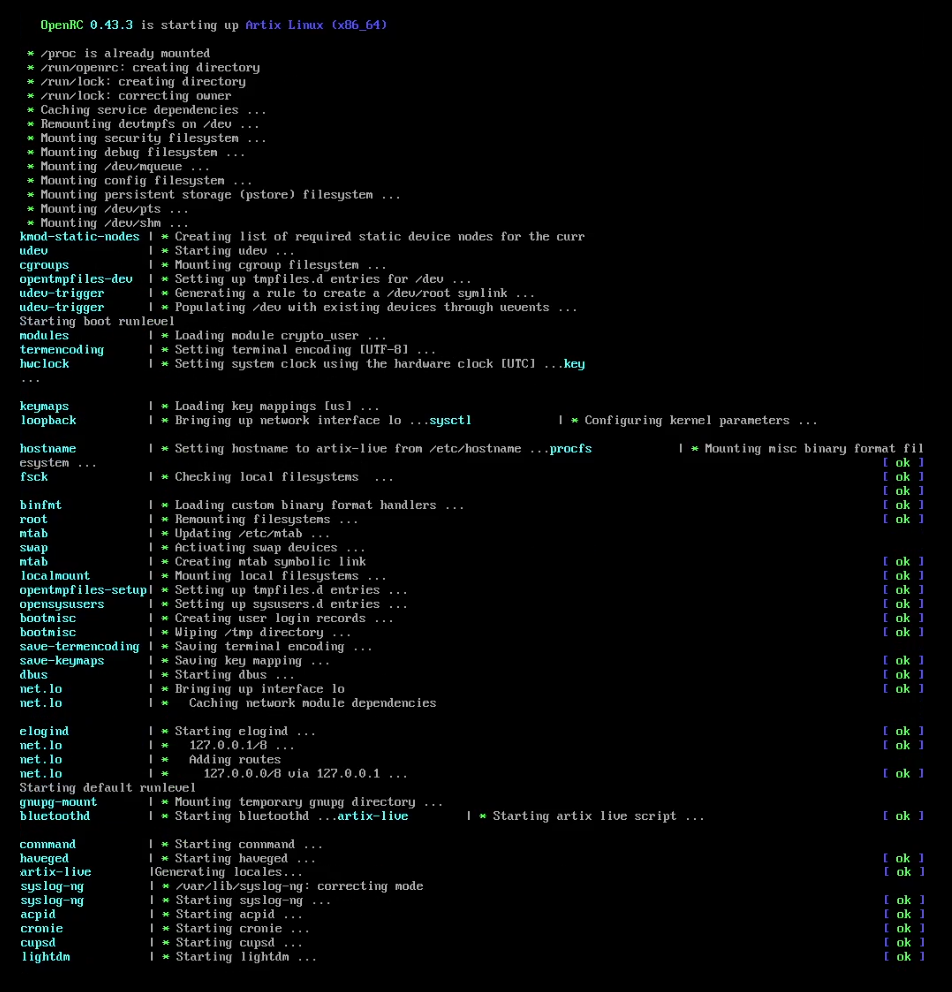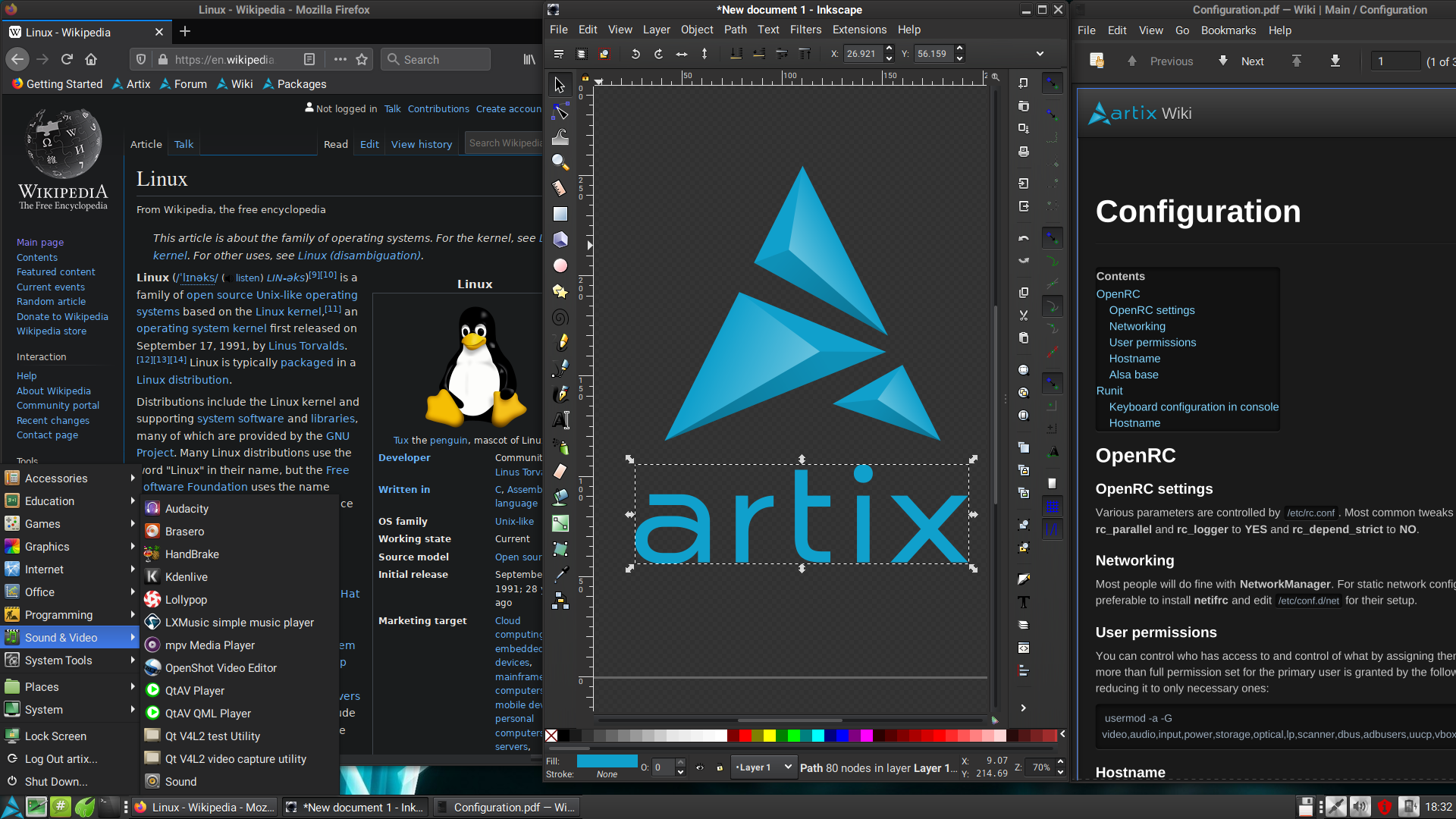|
OpenRC
OpenRC is a dependency-based init system for Unix-like computer operating systems. It was created by Roy Marples, a NetBSD developer who was also active in the Gentoo project. It became more broadly adopted as an init system outside of Gentoo following the decision by some Linux distributions not to adopt systemd. Adoption OpenRC is the default init system and/or process supervisor for: * Alpine Linux * Funtoo * Gentoo Linux * Hyperbola GNU/Linux-libre * Maemo Leste * Nitrux OpenRC is an available init system and/or process supervisor for: * Artix Linux * Devuan * Parabola GNU/Linux-libre * Arch Linux Design OpenRC is made up of several modular components, the main ones being an init (optional), the core dependency management system and a daemon supervisor (optional). It is written in C and POSIX-compliant shell, making it usable on BSD and Linux systems. The core part of OpenRC handles dependency management and init script parsing. OpenRC works by scanni ... [...More Info...] [...Related Items...] OR: [Wikipedia] [Google] [Baidu] |
Artix Linux
Artix Linux (or simply Artix ) is a rolling-release distribution based on Arch Linux that uses inits such as OpenRC, runit, s6, or Dinit, as opposed to Arch Linux's init systemd. Artix Linux has its own package repositories but, as a pacman-based distribution, can use packages from Arch Linux repositories or any other derivative distribution, even packages explicitly depending on systemd. The Arch User Repository (AUR) can also be used. Arch OpenRC began in 2012 and Manjaro OpenRC was subsequently developed alongside it. In 2017 these projects merged to create Artix Linux. Release history Artix initially offered two installation environments, a base command-line ISO image and the graphical Calamares installer based on LXQt desktop, with an i3 version following later. Those early versions featured the OpenRC init system. The latest installation media are available in a variety of desktop environments like LXDE, XFCE, MATE, Cinnamon and KDE Plasma 5. Additionally, two ... [...More Info...] [...Related Items...] OR: [Wikipedia] [Google] [Baidu] |
Alpine Linux
Alpine Linux is a Linux distribution designed to be small, simple and secure. Alpine Linux uses musl, BusyBox and OpenRC instead of the more commonly used glibc, GNU Core Utilities and systemd respectively.Security-Oriented Alpine Linux 3.7 Has UEFI Support, GRUB Support in Installer ''Softpedia News''10 Most Secure Linux Distros For Complete Privacy & Anonymity , 2017 Edition ''FossBytes'' For security, Alpine compiles all [...More Info...] [...Related Items...] OR: [Wikipedia] [Google] [Baidu] |
Systemd
systemd is a software suite that provides an array of system components for Linux operating systems. Its main aim is to unify service configuration and behavior across Linux distributions; Its primary component is a "system and service manager"—an init system used to bootstrap user space and manage user processes. It also provides replacements for various daemons and utilities, including device management, login management, network connection management, and event logging. The name ''systemd'' adheres to the Unix convention of naming daemons by appending the letter ''d''. It also plays on the term " System D", which refers to a person's ability to adapt quickly and improvise to solve problems. Since 2015, the majority of Linux distributions have adopted systemd, having replaced other init systems such as SysV init. It has been praised by developers and users of distributions that adopted it for providing a stable, fast out-of-the-box solution for issues that had exist ... [...More Info...] [...Related Items...] OR: [Wikipedia] [Google] [Baidu] |
Devuan
Devuan is a fork of the Debian Linux distribution that uses sysvinit, runit or OpenRC instead of systemd. Devuan aims to avoid "lock-in" by projects like systemd and aims to maintain compatibility with other init systems to avoid detaching Linux from other Unix systems. History With the release of Debian 8 some developers and users were alienated due to the project's adoption of systemd and subsequent removal of support for other existing init systems. This decision prompted some Debian community members to start a fork of Debian without systemd. Instead of continuing the Debian practice of using Toy Story character names as release codenames, Devuan aliases its releases using planet names. The first stable release shared the Debian 8 codename '' Jessie''. However, the Devuan release was named for minor planet 10464. The first stable release of Devuan was published on May 25, 2017. Devuan 2.0.0 ''ASCII'' was released on June 9, 2018, and 2.1 ''ASCII'' was released on Nov ... [...More Info...] [...Related Items...] OR: [Wikipedia] [Google] [Baidu] |
Init
In Unix-based computer operating systems, init (short for ''initialization'') is the first process started during booting of the computer system. Init is a daemon process that continues running until the system is shut down. It is the direct or indirect ancestor of all other processes and automatically adopts all orphaned processes. Init is started by the kernel during the booting process; a kernel panic will occur if the kernel is unable to start it. Init is typically assigned process identifier 1. In Unix systems such as System III and System V, the design of init has diverged from the functionality provided by the init in Research Unix and its BSD derivatives. Up until recently, most Linux distributions employed a traditional init that was somewhat compatible with System V, while some distributions such as Slackware use BSD-style startup scripts, and others such as Gentoo have their own customized versions. Since then, several additional init implementatio ... [...More Info...] [...Related Items...] OR: [Wikipedia] [Google] [Baidu] |
Sysvinit
In Unix-based computer operating systems, init (short for ''initialization'') is the first process started during booting of the computer system. Init is a daemon process that continues running until the system is shut down. It is the direct or indirect ancestor of all other processes and automatically adopts all orphaned processes. Init is started by the kernel during the booting process; a kernel panic will occur if the kernel is unable to start it. Init is typically assigned process identifier 1. In Unix systems such as System III and System V, the design of init has diverged from the functionality provided by the init in Research Unix and its BSD derivatives. Up until recently, most Linux distributions employed a traditional init that was somewhat compatible with System V, while some distributions such as Slackware use BSD-style startup scripts, and others such as Gentoo have their own customized versions. Since then, several additional init implementations have ... [...More Info...] [...Related Items...] OR: [Wikipedia] [Google] [Baidu] |
Linux
Linux ( or ) is a family of open-source Unix-like operating systems based on the Linux kernel, an operating system kernel first released on September 17, 1991, by Linus Torvalds. Linux is typically packaged as a Linux distribution, which includes the kernel and supporting system software and libraries, many of which are provided by the GNU Project. Many Linux distributions use the word "Linux" in their name, but the Free Software Foundation uses the name "GNU/Linux" to emphasize the importance of GNU software, causing some controversy. Popular Linux distributions include Debian, Fedora Linux, and Ubuntu, the latter of which itself consists of many different distributions and modifications, including Lubuntu and Xubuntu. Commercial distributions include Red Hat Enterprise Linux and SUSE Linux Enterprise. Desktop Linux distributions include a windowing system such as X11 or Wayland, and a desktop environment such as GNOME or KDE Plasma. Distributions intended for ... [...More Info...] [...Related Items...] OR: [Wikipedia] [Google] [Baidu] |
Hyperbola GNU/Linux-libre
Hyperbola GNU/Linux-libre is a Linux distribution for the i686 and x86-64 architectures. It is based on Arch Linux snapshots and Debian development. It includes the GNU operating system components and the Linux-libre kernel instead of the generic Linux kernel. Hyperbola GNU/Linux-libre is listed by the Free Software Foundation as a completely free operating system, true to their Free System Distribution Guidelines. History Hyperbola was born at the 17th annual ''Fórum Internacional Software Livre'' (Porto Alegre, Brazil). On 5 August 2017, support for systemd was dropped in favor of OpenRC as its default init system to support the Init Freedom Campaign begun by Devuan. On 6 December 2018, Hyperbola was the first Brazilian distribution recognized as a completely free project by GNU, making it part of the FSF list of free distributions. On 23 September 2019, Hyperbola announced its first release with the implementation of Xenocara as its default display server for the X Wind ... [...More Info...] [...Related Items...] OR: [Wikipedia] [Google] [Baidu] |
Gentoo Linux
Gentoo Linux (pronounced ) is a Linux distribution built using the Portage package management system. Unlike a binary software distribution, the source code is compiled locally according to the user's preferences and is often optimized for the specific type of computer. Precompiled binaries are available for some larger packages or those with no available source code. Gentoo Linux was named after the gentoo penguin, the fastest swimming species of penguin. The name was chosen to reflect the potential speed improvements of machine-specific optimization, which is a major feature of Gentoo. Gentoo package management is designed to be modular, portable, easy to maintain, and flexible. Gentoo describes itself as a meta-distribution because of its adaptability, in that the majority of users have configurations and sets of installed programs which are unique to the system and the applications they use. History Gentoo Linux was initially created by Daniel Robbins as the ''Enoch ... [...More Info...] [...Related Items...] OR: [Wikipedia] [Google] [Baidu] |
Maemo
Maemo is a software platform originally developed by Nokia, now developed by the community, for smartphones and Internet tablets. The platform comprises both the Maemo operating system and SDK. Maemo played a key role in Nokia's strategy to compete with Apple and Android, and that strategy failed for complex, institutional and strategic reasons. Maemo is mostly based on open-source code and has been developed by Maemo Devices within Nokia in collaboration with many open-source projects such as the Linux kernel, Debian, and GNOME. Maemo is based on Debian and draws much of its GUI, frameworks, and libraries from the GNOME project. It uses the Matchbox window manager and the GTK-based Hildon framework as its GUI and application framework. The user interface in Maemo 4 is similar to many hand-held interfaces and features a "home" screen, from which all applications and settings are accessed. The home screen is divided into areas for launching applications, a menu bar, a ... [...More Info...] [...Related Items...] OR: [Wikipedia] [Google] [Baidu] |
Parabola GNU/Linux-libre
Parabola GNU/Linux-libre is an operating system for the i686, x86-64 and ARMv7 architectures. It is based on many of the packages from Arch Linux and Arch Linux ARM, but distinguishes from the former by offering only free software. It includes the GNU operating system components common to many Linux distributions and the Linux-libre kernel instead of the generic Linux kernel. Parabola is listed by the Free Software Foundation as a completely free operating system, true to their Free System Distribution Guidelines. Parabola uses a rolling release model like Arch, such that a regular system update is all that is needed to obtain the latest software. Development focuses on system simplicity, community involvement and use of the latest free software packages. History Parabola was originally proposed by members of the gNewSense IRC channel in 2009. Members of different Arch Linux communities, especially Spanish-speaking members, started the development and maintenance of the proj ... [...More Info...] [...Related Items...] OR: [Wikipedia] [Google] [Baidu] |




.jpg)
